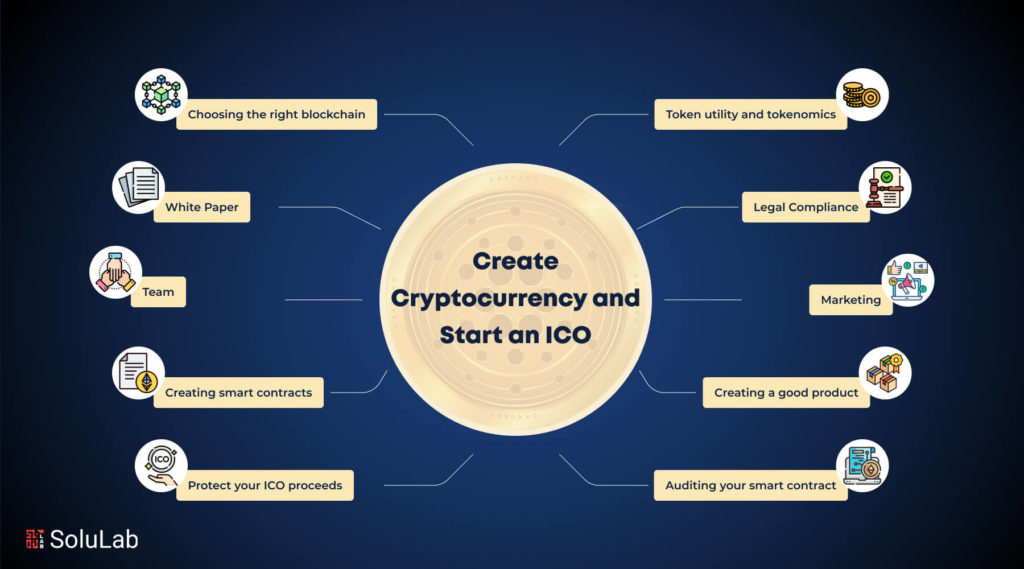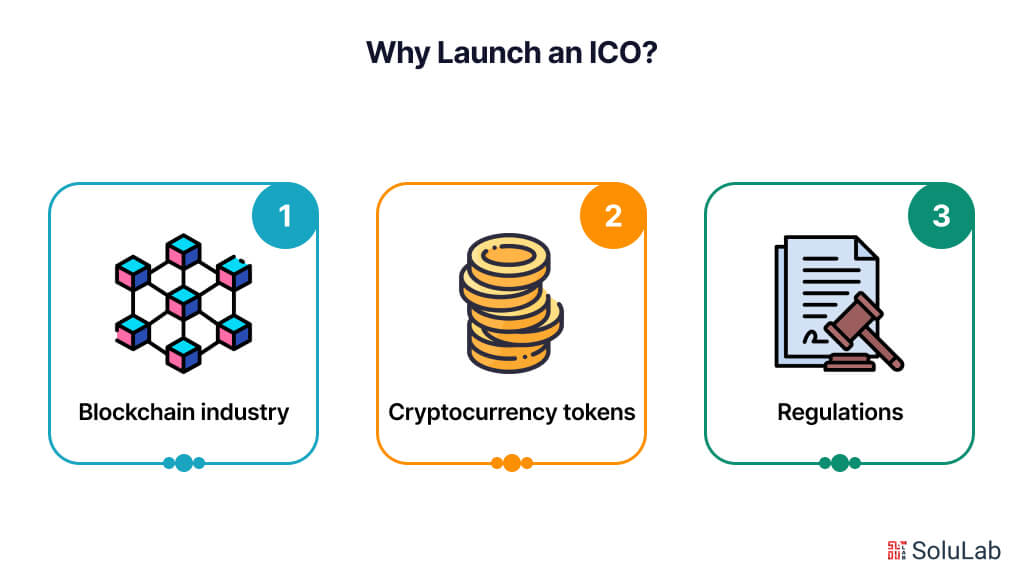
Most people agree that starting an Initial Coin Offering (ICO) is a quick and straightforward method to raise money for your enterprise. However, there is more to it than meets the eye, as the regulations around cryptocurrencies make launching an ICO risky, technically challenging, and difficult to market. This page provides an extensive guide on how to start an ICO, including detailed instructions on how to Create Your Own Cryptocurrency and the ICO process. You will also find alternatives to help you decide the best fundraising option for you. Whether you’re looking to build your own cryptocurrency or understand how to create cryptocurrency, this guide covers everything you need to know to start an ICO successfully.
How to Set Up an Initial Coin Offering?
Let’s discuss the ten steps you must take to construct an initial coin offering (ICO) now that you have made the decision to launch your cryptocurrency.
1. White paper
A white paper is a research-based document that explains your project’s technical details and reasoning. You are making this thing, but why? Which issues are you trying to resolve? How are you going to tackle those issues? What use will your token for cryptocurrencies serve?
The creation of a peer-to-peer electronic currency system is covered in length in the 2008 Bitcoin whitepaper written by the anonymous Satoshi Nakamoto. After outlining the possible issues (double spending) that the Bitcoin network could encounter, Nakamoto provides technical information on timestamp servers and proof-of-work schemes to address this problem.
In the same way, a founder should make every effort to include every detail in a white paper. Peers who could be interested in investing in or supporting the initiative will review the white paper closely. Technically and commercially speaking, the white paper is perhaps the most significant document.
Your ICO might not succeed if the audience is not persuaded by your whitepaper.
2. Token utility and tokenomics
To decide whether to invest in a cryptocurrency, potential buyers want to understand the utility of your token. A cryptocurrency token without practical use may end up as a meme coin, intended solely for trading purposes. For some systems, tokens are often used as a medium of exchange. Native tokens of layer one (L1) are used to pay gas fees, while discount tokens are issued by cryptocurrency exchanges. Many decentralized apps offer tokens with attached voting rights. Tokenomics is an essential aspect that investors thoroughly investigate. Is your token inflationary, like Cosmos’ ATOM, or hardcapped, like Bitcoin? What portion of the tokens is allocated to early investors and the development team? Do these investors have a vesting term and a cliff period? Tokenomics directly impacts a token’s market price, making these questions crucial when considering how to create a cryptocurrency or how to start an ICO. Whether you want to know how do you make your own cryptocurrency or understand the ICO process, these factors are vital to the success of your Initial Coin Offering (ICO). Understanding how to create an ICO and build crypto involves addressing these key aspects to attract and retain investors.
3. Legal Compliance
We can’t emphasize this section enough. Ensuring legal compliance is crucial; otherwise, the authorities may eventually knock on your door.
To safeguard oneself against the unpredictable regulatory environment around cryptocurrencies and token sales, creators must give legal compliance top priority while organizing an ICO launch.
- First and foremost, creators need to think about the jurisdiction in which they plan to introduce the initial coin offering (ICO), as laws differ widely between nations. You might need to comply with disclosure laws and register the ICO launch with securities regulators in some areas.
- Second, creators must remember that, depending on the jurisdiction in which the ICO is launched, it may be subject to know-your-customer (KYC) and anti-money laundering (AML) compliances.
- Lastly, taxes should not be overlooked. Tax laws pertaining to ICOs and cryptocurrencies are currently in the process of being formulated. Therefore, in order to lower the danger of legal ramifications and cultivate confidence with possible investors, it is imperative to confer with a legal and financial specialist.
4. Team
It should go without saying that any project or business must have the correct staff. Any idea’s most challenging aspect is its execution, and without a qualified team, your vision will be just that—a notion.
A team of software and blockchain engineers, UI/UX designers, copywriters, sales and marketing executives, and other professionals will be needed for your blockchain project. Adding really credible individuals to your advisory board will benefit your project in many ways.
By setting aside a portion of the ICO’s earnings and tokens for your team, you may encourage them.
5. Choosing the Right Blockchain
There are a plethora of blockchains available. It will be your responsibility as a founder to choose a blockchain that aligns with your values and mission. The first blockchain that springs to mind when considering a platform for an initial coin offering (ICO) is Ethereum. ICO launches were made possible in the first place by Ethereum’s power.
In terms of total value locked and active users, Ethereum remains the world’s most popular smart contract platform. It is regarded as one of the world’s safest public blockchains as well. But because of Ethereum’s widespread use, the blockchain is congested, which causes sluggish transactions and expensive gas costs.
You might introduce your tokens on an Ethereum layer-two (L2) rollup such as Base or Optimisim if high gas costs are an issue. L2s are gaining traction over time because they let users benefit from Ethereum’s security without having to pay its expensive gas costs.
Poygon and BNB Chain are two well-liked alternative blockchains. ICO producers particularly prefer the BNB Chain because of its interaction with Binance, the largest cryptocurrency exchange in the world. Binance offers its cryptocurrency investors access to newly issued tokens on the BNB Chain through Binance Launchpad, a specialized BSC ICO platform.
6. Creating Smart Contracts
Smart contracts control the Create Cryptocurrency on blockchains such as Ethereum and BNB Chain. For your ICO to be launched, a smart contract must be created. Tokens on Ethereum are created using the most widely used token standard, which is ERC-20.
You won’t have any trouble designing a smart contract if you have a team of engineers and programmers. You can generate how to make your own cryptocurrency with ThirdWeb and other no-code alternatives if you don’t have a lot of resources.
Code libraries such as OpenZeppelin can also be used to expedite the generation of smart contracts. These libraries offer a databank of deployable, tested, and community-reviewed code.
7. Auditing your Smart Contract
Any flaws and vulnerabilities in your code will be found through auditing. Before releasing your smart contract to the blockchain, you should audit it, especially if it was created for an initial coin offering (ICO).
Since you are working with someone else’s money, you must take all required precautions to guarantee the security of investment cash. If not, you can end up in hot water.
Additionally, auditing will guarantee that there are no hiccups or technological issues during the ICO process. You might submit your smart contract for public evaluation and consider offering bug bounties, or you can get in touch with reputable auditing services.
8. Protect your ICO Proceeds
An address for your wallet that will receive ICO funds must be included when setting up your smart contract.
It is advised that you utilize hardware wallets with the strongest security available. A multi-sig hardware wallet may also be used if your team is larger and you have more founding members.
Moreover, you may program the smart contract to distribute the ICO funds to several wallet addresses in order to spread out the risk in the event that one wallet is hacked. It is important to always prioritize security in the realm of cryptocurrency.
You’ve probably heard the proverb “Better safe than sorry.”
9. Marketing
Get the best cryptocurrency initial coin offering (ICO) via marketing. No matter how great your idea is, consider this: if potential investors are unaware of your project, they will not have the opportunity to invest in it.
A strong website’s branding is the foundation of effective marketing. The public face of your initiative will be your website. You might even designate your website as your ICO’s minting page.
In the present day, increasing brand awareness through blogs, videos, and social media is essential. Because the caliber of the information is so great, you will need to make an investment to get seen. Employing copywriters, community managers, social media moderators, and content producers will be beneficial.
Remember that among enthusiasts of cryptocurrency, Twitter and Discord are the most widely used social media sites. To reach more people, if you have the money, you may employ influencers and purchase advertisements.
Related: ICO Vs IPO: What’s the Difference?
10. Creating a Good Product
Sometimes developing a product that people want to use is the greatest approach to promote your initial coin offering (ICO). You can make your idea so popular that enough people would be eager to invest in your initial coin offering (ICO). This was shown with Ethereum’s layer-two rollup, Arbitrium.
The goal of Arbitrium was to provide a scaling solution for Ethereum that anybody could use and expand upon. People were excitedly awaiting the introduction of Arbitirum’s ARB token when the company announced its formation. Arbitirum didn’t need to worry about marketing because their accomplishments are enough to speak for themselves.
How Much Does It Cost to Launch an ICO?
By now, you probably know that starting an initial coin offering (ICO) is not inexpensive. It is not possible to cite an exact number here. It truly relies on your spending limit and your objectives. How much it costs to how to create a cryptocurrency
These are a few costs you could have for your impending initial coin offering:
- Employee costs
- Attorney fees
- costs for consultations
- Gas costs for contract deployment and testing
- Hardware wallet costs
- Advertising and influencer costs
- Expenses for websites: domains, hosting
Why Launch an ICO?

Here are some points to help you decide on your crypto ICO.
1. Blockchain Industry
Do you have any projects involving blockchain technology? Should blockchain be used in your project at all? Fundamentally, blockchain technology is just a sophisticated database that can be adjusted to emphasize decentralization and transparency and can be created to be open source. Founders must remember that not every idea is a good fit for blockchain technology.
It can make sense to start an initial coin offering (ICO) if your project is centered around blockchain technology or if operating in a decentralized or peer-to-peer environment is important to you.
2. Cryptocurrency Tokens
Is a crypto token even necessary for your project? This is the most typical mistake that most entrepreneurs make. By no means is using blockchain technology a requirement to Create Cryptocurrency.
The process of developing, marketing, and maintaining cryptocurrency tokens and smart contracts is fraught with several hazards and complexities. Rather than dealing with market risks, token marketing, tokenomics, hacks, and cryptocurrency, your team could be better off investing time and money into developing a workable product or service.
Above all, a project ought to have value even in the absence of its coin. A project will eventually collapse (and take its token down with it) if the only reason it is unique is that its cryptocurrency token is gaining attention in the marketplace.
It could make sense to start an ICO if your cryptocurrency token will have a notable usefulness.
3. Regulations
Before establishing an ICO, founders need to consider the legislation pertaining to cryptocurrency in their operational regions. The US Securities and Exchanges Commission (SEC) has been pursuing a number of cryptocurrency creators for allegedly trading “unregistered securities” despite not registering with the agency. As of this writing, there is a great deal of uncertainty around crypto regulations. The US SEC is adamant about policing cryptocurrency and initial coin offerings.
There are now solutions that can shield you from regulatory scrutiny and provide you with some of the advantages of an initial coin offering (ICO). Later in this post, we’ll discuss those choices.
Alternatives to ICOs
There are alternatives to ICOs that you should be aware of. Learn about them here before making your final decision.
1. Initial Exchange Offering (IEO)
IEO stands for initial exchange offering, which is sold on a cryptocurrency exchange.
ICOs and IEOs are comparable. You build a smart contract for your freshly produced tokens, but you want to issue the tokens through a cryptocurrency exchange rather than sending investors to a mint page.
Because the cryptocurrency exchange may decide to do due diligence on the coin issuer’s smart contract before listing the coins, IEOs are thought to be safer for investors than ICOs. Investors will have an additional degree of security from this third-party due diligence, which might provide legitimacy to the token sale.
Related: ICO vs. STO: What’s the Difference?
2. Security Token Offering (STO)
The term “STO” describes the controlled selling of cryptocurrency tokens. Since the cryptocurrency tokens are categorized as “securities” in this case, they have to abide by regulations imposed by market watchdogs like the US SEC.
Promoters of STOs will need to adhere to disclosure regulations, which entails disclosing to the public, prior to token offerings, the business strategy, associated risks, team makeup, and other confidential information.
Founders may proceed with their fundraising without fear of regulatory scrutiny in the future when they utilize STO.
Conclusion
Creating a cryptocurrency from scratch and starting an ICO can be a complex yet rewarding process. By carefully planning each step, from conceptualizing your unique value proposition to executing a successful ICO, you can tap into the immense potential of the cryptocurrency market. Partnering with a professional cryptocurrency development company can simplify this journey. Such companies offer comprehensive cryptocurrency services, including technical development, compliance, and marketing, ensuring your project stands out in a competitive landscape.
To maximize the effectiveness of your ICO, consider engaging an ICO Development Company that provides specialized ICO development services. These experts can guide you through the intricacies of the ICO process, from smart contract development to token distribution, and help you navigate regulatory requirements. By leveraging these cryptocurrency solutions, you can build a robust and secure platform that attracts investors and achieves your business goals.
For those looking to build crypto projects, SoluLab offers comprehensive support and expertise. From helping you how to create a cryptocurrency to guiding you through the process of how to start an ICO, SoluLab ensures that your project is poised for success in the rapidly evolving digital landscape.
FAQs
1. How do you make your own cryptocurrency?
To make your own cryptocurrency, you’ll need to define your unique value proposition, select a blockchain platform, write the necessary code, create smart contracts, and test the cryptocurrency thoroughly. Collaborating with a development team or hiring a cryptocurrency development company can streamline this process.
2. How to create a cryptocurrency?
Creating cryptocurrency involves choosing the right blockchain, developing the digital currency through smart contracts, and setting up a secure environment for transactions. Comprehensive planning and professional expertise are crucial to ensure a successful launch.
3. What are the steps to make your own cryptocurrency?
The steps to make your own cryptocurrency include conceptualizing your idea, selecting a blockchain platform, developing the cryptocurrency, implementing smart contracts, conducting thorough testing, and preparing for the launch. It’s beneficial to work with experts who offer cryptocurrency services to navigate these steps efficiently.
4. How do you create a cryptocurrency from scratch?
To create a cryptocurrency from scratch, you need to define your project’s goals, choose the right blockchain technology, write and deploy the smart contracts, ensure the security of the platform, and plan for the launch. Engaging with a cryptocurrency development company can help manage these tasks effectively.
5. What is the process to start an Initial Coin Offering (ICO)?
The ICO process involves defining your project, creating a whitepaper, developing the cryptocurrency, marketing the ICO, and ensuring compliance with legal regulations. Partnering with an ICO Development Company can help manage these tasks and provide specialized ICO development services.
6. How to create an ICO and what are the necessary steps?
Creating an ICO involves several steps: drafting a comprehensive whitepaper, developing the token, setting up a secure environment for the ICO, marketing the ICO, and ensuring regulatory compliance. Professional services can help guide you through the process of how to start an ICO, from inception to execution.
7. What are the key elements to consider when you build crypto and start an ICO?
When you build crypto and start an ICO, consider factors such as the uniqueness of your cryptocurrency, the choice of blockchain, smart contract development, security measures, regulatory compliance, and effective marketing strategies. Utilizing cryptocurrency solutions can enhance the chances of a successful ICO.






